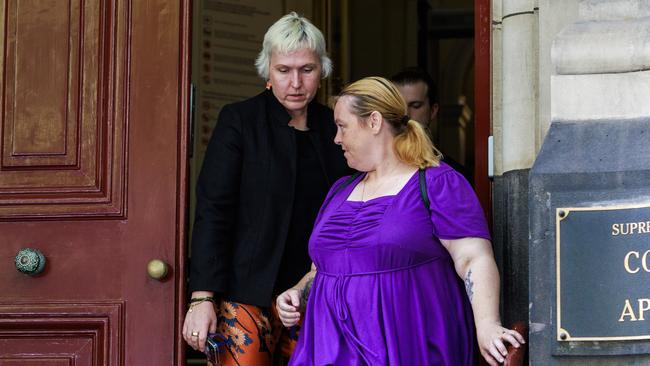Jordan Riley sentenced for manslaughter of Port Melbourne chef
A lifelong cannabis user who had started using meth stabbed his roommate and dumped his body at a hospital after ceasing treatment for schizophrenia.
Dump-and-dash killer Jordan Riley has been sentenced to eight years in prison for the manslaughter of roommate Daniel Cockerill last year.
The 42-year-old was charged after dumping the 45-year-old Port Melbourne chef outside a Melbourne hospital with a 5.3cm stab wound to the heart in March last year.
Delivering his sentencing remarks in the Supreme Court on Monday, Justice Stephen Kaye noted that Jordan would have served 10 years if not for his decision to plead guilty last month.

Other mitigating factors, he found, included Riley’s long history of mental illness and the decision to take a critically injured Mr Cockerill to the hospital in Melbourne’s east.
Adding that Mr Cockerill “was loved by each of his cousins who regarded him as less of a cousin and more of a brother”, Justice Kaye told Riley their pain was a reminder of the “grief and suffering … caused by the offence in which you are complicit”.

Riley was caught dumping a dying Mr Cockerill at Casey Hospital about 7.30pm on March 26 in a maroon Volvo sedan belonging to his victim’s associate.
The court was told the pair had been drinking earlier with Ayant Singh, who knew Riley for several years and was in the back seat when Mr Cockerill was dumped.
Mr Singh was not involved in any wrongdoing and was released after questioning.
CCTV from a nearby Coles Express petrol station showed all three men alive in the car earlier that night. The precise circumstances of the stabbing remain unknown.
Riley – a paranoid schizophrenic – still refuses to acknowledge that Mr Cockerill died from the stab wounds identified by the autopsy as the cause of death, instead insisting that he died from a drug injection.

Forensic analysis conducted on the sedan after Riley’s arrest found a pyrex kitchen knife and a sheet, with analysis revealing a match for Mr Cockerill’s DNA on the blade and Riley’s on the handle.
A lifelong user of cannabis who had “more recently used meth once a month”, Riley had been involuntarily admitted to psychiatric institutions three times since his diagnosis in 2014, the court was told, and suffered “longstanding delusions of being drugged and sexually assaulted”.
Riley previously served a six-month sentence in prison for assaulting a police officer in 2021.
While he was treated with antipsychotic medication during his time in prison, Riley ceased treatment after his release, Justice Kaye said.
“As a consequence, you were untreated in the period between your release and the time of the offence,” the judge said.
In a report submitted to the court, a psychiatrist found “it was not possible to determine if you were mentally ill at the time of the offence but concluded it was very likely you were psychotic at the time”.
While Justice Kaye acknowledged that Riley’s “moral culpability was materially less” as a result of his psychosis, he added that his lack of awareness of his own mental illness and the long history of previous offences were “relevant to his prospects for rehabilitation”.
Mr Cockerill’s family attended the sentencing, staring blankly through Riley as he walked past them to enter the courtroom.
Riley was sentenced to eight years and six months in prison with a minimum of five years and three months without parole.

